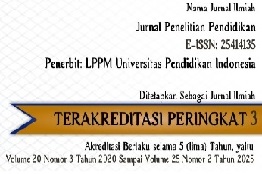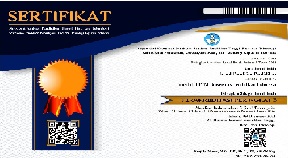Pembelajaran Argument Driven Inquiry Pada Materi Suhu dan Kalor Untuk Meningkatkan Kemampuan Argumentasi Ilmiah Siswa
Abstract
Abstrak
Pembelajaran berbasis proyek merupakan salah satu model pembelajaran yang direkomendasikan untuk digunakan dalam pembelajaran menurut kurikulum 2013. Pelaksanaan proses pembelajaran di Sekolah Menengah Kejuruan (SMK) memiliki karakteristik yang berbeda dengan pelaksanaan pembelajaran di Sekolah Menengah Atas (SMA). Guru SMK harus mampu mengembangkan model pembelajaran yang dapat menghasilkan aspek keterampilan kerja. Salah satu masalah paling kritis dalam proses belajar mengajar Bahasa Inggris di Sekolah Menengah Kejuruan adalah keengganan dan kreativitas guru yang kurang untuk menemukan cara agar pembelajaran lebih kreatif dan menyenangkan. Untuk mengetahui sejauh mana pemahaman siswa tentang suatu materi yang telah diajarkan dalam proses belajar mengajar, guru harus memberikan tugas kepada siswa. Penugasan dapat dilakukan dengan model Pembelajaran Berbasis Proyek (PjBL). Tujuan dari penelitian ini adalah untuk mengetahui bagaimana persepsi guru tentang pembelajaran berbasis proyek. Penelitian ini dilakukan dalam desain deskriptif kualitatif yang melibatkan tiga guru Bahasa Inggris SMK di Kabupaten Indragiri Hilir, Provinsi Riau sebagai responden. Penelitian ini menggunakan wawancara semi terstruktur sebagai instrumen pengumpulan data. Hasil analisis menunjukkan bahwa guru memiliki persepsi positif terhadap pembelajaran berbasis proyek. Dapat ditarik kesimpulan bahwa pembelajaran berbasis proyek perlu dilakukan oleh guru di kelas Bahasa Inggris sebagai salah satu model dalam proses belajar mengajar karena berfokus pada siswa.
Kata Kunci: Pembelajaran Berbasis Proyek, Persepsi Guru, dan Sekolah Menengah Kejuruan.
Abstract
Project-based learning is one of the recommended learning models to be used in learning according to the 2013 curriculum. The implementation of the learning process in Vocational High Schools has different characteristics from the implementation of learning in Senior High Schools. Vocational high school teachers must be able to develop learning models that can produce aspects of work skills. One of the most critical problems in teaching and learning English at Vocational High School is teachers’ unwillingness and less creativity to find ways to make learning more creative and fun. To find out to what extent students understand the material that has been taught in the teaching and learning process, the teachers must give assignments to the students. The assignments can be done with the model Project-Based Learning. The aim of this study was to investigate how teachers’ perceptions about project-based learning. This research was conducted in descriptive qualitative design which involved three vocational high school English teachers in Indragiri Hilir Regency, Riau Province as respondents. This research used the semi-structured interview as an instrument to collect the data. The result of the analysis showed that teachers have a positive perception of project-based learning. The conclusion can be drawn that project-based learning was needed to do by the teachers in the EFL classroom as one of the models in the teaching and learning process because its focus on student-centered.
Keywords: Project-Based Learning, Teachers’ Perception, and Vocational High School.
Keywords
Full Text:
PDF (Bahasa Indonesia)References
Albe, V., & Gombert, M.-J. (2012). Students’ communication, argumentation and knowledge in a citizens’ conference on global warming. Cultural Studies of Science Education, 7(3), 659–681. https://doi.org/10.1007/s11422-012-9407-1
Asra, H. S., Diana, S., & Amprasto. (2018). Implementation of inquiry-based field trip method to improve critical thinking and problem solving skills of students on plantae topic. International Conference on Mathematics and Science Education “Promoting 21st Century Skills Through Mathematics and Science Education,” 3, 103–107. http://science.conference.upi.edu/proceeding/index.php/ICMScE/issue/view/3
Bulgren, J. A., Ellis, J. D., & Marquis, J. G. (2014). The Use and Effectiveness of an Argumentation and Evaluation Intervention in Science Classes. Journal of Science Education and Technology, 23(1), 82–97. https://doi.org/10.1007/s10956-013-9452-x
Dawson, V. M., & Venville, G. (2010). Teaching Strategies for Developing Students’ Argumentation Skills About Socioscientific Issues in High School Genetics. Research in Science Education, 40(2), 133–148. https://doi.org/10.1007/s11165-008-9104-y
Demircioglu, T., & Ucar, S. (2015). Investigating the effect of argument-driven inquiry in laboratory instruction. Kuram ve Uygulamada Egitim Bilimleri, 15(1), 267–283. https://doi.org/10.12738/estp.2015.1.2324
Erduran, S., Simon, S., & Osborne, J. (2004). TAPping into argumentation: Developments in the application of Toulmin’s Argument Pattern for studying science discourse. Science Education, 88(6), 915–933. https://doi.org/10.1002/sce.20012
Fraenkel, J.R., Wallen, N. . (2012). How to Design and Evaluate Research in Education (8th ed.). McGraw-Hill.
Mulyasa. H. E. (2014). Pengembangan dan Implementasi Kurikulum 2013 (Anang Solihin Wardan (ed.)). Remaja Rosdakarya.
Handayani, P. (2015). Analisis argumentasi peserta didik kelas x sma muhammadiyah 1 palembang dengan menggunakan model argumentasi toulmin. Jurnal Inovasi dan Pembelajaran Fisika, 2(1), 60-68.
Ika Noviyanti, N., Rosyadah Mukti, W., Dahlia Yuliskurniawati, I., Mahanal, S., & Zubaidah, S. (2019). Students’ scientific argumentation skills based on differences in academic ability. Journal of Physics: Conference Series, 1241(1). https://doi.org/10.1088/1742-6596/1241/1/012034
Kaniawati, I., & Suhandi, A. (2014). PENERAPAN MODEL PEMBELAJARAN PEMBANGKIT IMPLEMENTATION OF GENERATE ARGUMENT INSTRUCTIONAL MODEL USING SCIENTIFIC METHOD TO INCREASE THE COGNITIVE ABILITIES AND. 10(2), 104–116. https://doi.org/10.15294/jpfi.v10i2.3347
Kind, P., Kind, V., Hofstein, A., & Wilson, J. (2011). Peer Argumentation in the School Science Laboratory—Exploring effects of task features. International Journal of Science Education, 33, 2527–2558. https://doi.org/10.1080/09500693.2010.550952
Kisida, B., Bowen, D. H., & Greene, J. P. (2015). Measuring Critical Thinking: Results From an Art Museum Field Trip Experiment. Journal of Research on Educational Effectiveness, 9(March), 171–187. https://doi.org/10.1080/19345747.2015.1086915
Manni, A., Ottander, C., Sporre, K., & Parchmann, I. (2013). Perceived learning experiences regarding Education for sustainable development: –within Swedish outdoor education trADItions. NorDiNa: Nordic Studies in Science Education, 9(2), 187–205.
Orion, N., & Hofstein, A. (1994). Factors that influence learning during a scientific field trip in a natural environment. Journal of Research in Science Teaching, 31(10), 1097–1119. https://doi.org/10.1002/tea.3660311005
Osborne, J. (2010). Arguing to Learn in Science: The Role of Collaborative, Critical Discourse. Science, 328(5977), 463 LP – 466. https://doi.org/10.1126/science.1183944
Patrick, A. O. (2010). Effects of Field Studies on Learning Outcome in Biology. Journal of Human Ecology, 31(3), 171–177. https://doi.org/10.1080/09709274.2010.11906312
Wahdan, W. Z., Sulistina, O., & Sukarianingsih, D. (2017). Analisis Kemampuan Berargumentasi Ilmiah Materi Ikatan Kimia Peserta Didik Sma, Man, Dan Perguruan Tinggi Tingkat I. J-PEK (Jurnal Pembelajaran Kimia), 2(2), 30–40. https://doi.org/10.17977/um026v2i22017p030
Walker, J. P., & Sampson, V. (2013). Argument-Driven Inquiry: Using the Laboratory To Improve Undergraduates’ Science Writing Skills through Meaningful Science Writing, Peer-Review, and Revision. Journal of Chemical Education, 90(10), 1269–1274. https://doi.org/10.1021/ed300656p
DOI: https://doi.org/10.17509/jpp.v21i2.37134
Refbacks
Copyright (c) 2021 Jurnal Penelitian Pendidikan


